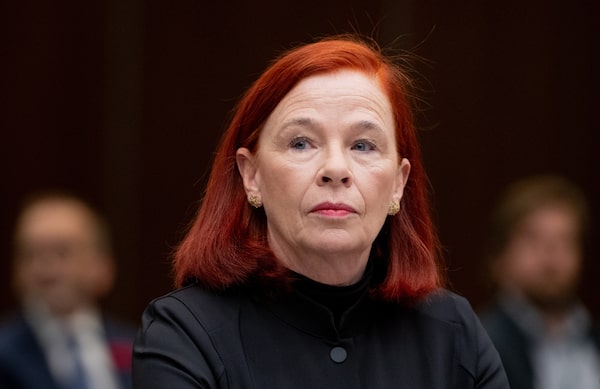
CBC President Catherine Tait waits to appear before the Standing Committee on Canadian Heritage in Ottawa, on Nov. 2.Spencer Colby/The Canadian Press
When the smart people running the CBC were looking to produce a French version of one of its podcasts this year, it somehow never dawned on them that outsourcing the adaptation to a Paris-based production house might not be viewed as a stroke of genius.
Canada, after all, is an officially bilingual country. The Broadcasting Act stipulates that the CBC is our national public broadcaster in French and English with a mandate to, among other things, “contribute to a shared national consciousness and identity.”
The CBC even has a highly respected French-language network called Radio-Canada whose staff and studios are located in the same buildings as the CBC across the country. Outsourcing a translation to France was not just a waste of money. It was a huge insult to French-Canadian artists and translators who could do the job as well or even better.
If that was not enough, the executive producer of CBC Podcasts, Cesil Fernandes, told Le Journal de Montréal, which broke the story: “We didn’t want Quebec French, to favour international interest.”
That Mr. Fernandes or no one else at the CBC seemed to know that Quebec has a huge pool of professionals who do precisely the type of international French adaptations the Toronto-based podcast crew was seeking speaks volumes about the cultural divide within the public broadcaster. CBC and Radio-Canada barely talk to each other any more.
An uproar in Quebec over the podcast forced CBC president Catherine Tait to pull the Paris-produced version and order a new Quebec-made one. But the reputational damage to the CBC was done, and the dollars spent on the first French adaptation have gone irretrievably down the drain.
Barry Kiefl: In its push to digital, the CBC is starving its news coverage
CBC stands to get largest share of cash from Online News Act, experts say
The incident is revealing considering comments Ms. Tait made in a Tuesday speech in which she decried “the rise of polarization and populism” that threatens public broadcasters. She did not specifically mention Conservative Leader Pierre Poilievre’s vow to “defund” the CBC (while keeping Radio-Canada intact), but there was no mistaking who she was talking about.
“Don’t make the mistake of thinking those who attack the CBC will spare Radio-Canada,” Ms. Tait told a Montreal Chamber of Commerce audience. “Our two networks are interconnected. That’s true from a technological, operational and even content perspective.”
It is true that the CBC and Radio-Canada share space and production equipment. But culturally speaking, the two networks have increasingly little in common, and relations between them have soured considerably on Ms. Tait’s watch.
The sudden departure last month of Michel Bissonnette as the executive vice-president of French services, the top job at Radio-Canada, came on the heels of a year-long cold war with Ms. Tait over her handling of a listener complaint regarding a 2020 French radio broadcast, which had referred to a Quiet Revolution-era book with a title that includes the N-word.
In 2022, the Canadian Radio-television and Telecommunications Commission ruled the use of the N-word went “against the objectives and values” that the public broadcaster is obliged to uphold under the Broadcasting Act.
Ms. Tait issued a public apology. The CBC then appealed the ruling, but only after dozens of Radio-Canada employees denounced what they deemed CRTC interference in the network’s journalism. The Federal Court found in June that the CRTC “exceeded its jurisdiction and erred in law” and ordered the regulator to start over.
Ms. Tait’s apology will not be soon forgotten at Radio-Canada’s Montreal headquarters. The podcast fiasco has only intensified the antipathy toward the president among staff at the French network. Many had hoped she would be gone by now. But then-Heritage minister Pablo Rodriguez extended her term in June for 18 months, instead of naming her for a second five-year mandate.
The next year will not be an easy one for Ms. Tait or the CBC.
The country’s money-losing private broadcasters are slashing staff numbers and production budgets. While the loss of viewers to foreign streaming services is the main cause of their woes, competition from the CBC for scarce advertising dollars is depriving them of a critical source of cash when they most need it.
That is particularly true in Quebec, where the Quebecor-owned TVA network last week said it is cutting a third of its work force, or 547 jobs, and shutting down its production unit. Almost 100 jobs will be cut at TVA’s regional news operations alone. TVA singled out “unfair competition from CBC/Radio-Canada, which behaves like a private broadcaster by competing for ratings and advertising dollars” as a major reason for the gutting.
Radio-Canada – which, unlike the CBC, still enjoys healthy ratings – generated more advertising revenue than the much larger English network in the 2022-23 fiscal year that ended in March. But TVA and the Bell Media-owned Noovo network argue that Radio-Canada’s populist programming is outside its mandate and that its advertising-cash grab is threatening their own viability.
And they are pressing Ottawa to finally do something about it.
 Konrad Yakabuski
Konrad Yakabuski